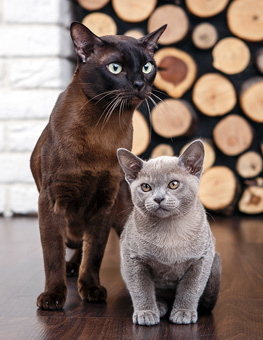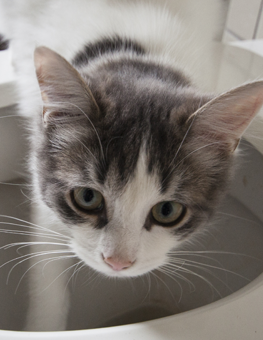The Advantages of Adopting a Senior Pet
Many hopeful pet parents visit shelters or browse rescue websites looking for a new kitten or puppy to welcome into their family.

Adopting a senior pet shows compassion and how one values life at all ages.
Older companion animals are often overlooked, and prove to be the most difficult shelter pets to place in a new home, despite their great qualities. November is National Adopt a Senior Pet Month. If you’re considering growing your household by four paws, here’s what it means to consider a senior cat or a senior dog.
Age is Just a Number
There are many great reasons for opening your heart and adopting a senior pet over a younger one, but perhaps the greatest aspect is the statement it makes about compassion and the value of life at all ages.
- They’re calmer and less energetic. Senior pets have graduated from puppy and adulthood. They have an established temperament, making it easier to determine if they will fit into your family’s expectations. Because senior cats and dogs have a lower energy level, they’re less likely to become destructive and make better, gentler playmates for children. They’ve also been socialized and have already learned what it takes to fit in with people and other pets.
- You CAN teach them new tricks. Dogs are trainable at any age, but those with a few more experience years under their collars have a greater attention span, which makes them easier to train if they don’t already know basic obedience and house manners.
- They’ve mastered bathroom etiquette. Some adopters might not realize just how much hard work and dedication it takes to housetrain a kitten or puppy. Most older shelter pets once lived in a home, so they usually know the drill on do’s and don’ts when it comes to number 1 and number 2.
- What you see is what you get. Senior pets take the guesswork out of how big a kitten or puppy will become, and what type of personality they’ll have. While younger animals are still growing physically and developing their personalities, with older pets, you’ll know right away whether they love to cuddle or are more independent.
- You’re saving a life. By adopting an older pet, you’ll gain a loyal friend and provide them with a warm, loving home. There’s a misconception that senior cats and dogs in shelters have behavioral problems, but the truth is most end up there due to their owners being unable to keep them for various reasons: death, allergies, financial hardship, relocation and other lifestyle changes.

A senior cat or a senior dog can have many happy and healthy years ahead of them.
How Old are Senior Pets?
Most pet lovers understand that cats and dogs of varying breeds and sizes age at different rates, In recent years feline and canine life stages have been redefined.
Veterinary professionals consider dogs to be senior in age when they reach 5-7 years old. Cats become senior at about 9 years old.
Preparing to Adopt a Senior Cat or a Senior Dog
Adopting a senior pet can present some challenges. While veterinary care is needed at all life stages, it can be more costly for an advanced age pet.
Before adopting a senior cat or a senior dog, it’s wise to get a health report from a veterinarian. If it is discovered that the animal has more health concerns than anticipated, you can adequately assess whether you will be able to fulfill the financial commitment of caring for a senior pet before making the emotional one.
Otherwise, older pets require all the things younger ones do – good nutrition, exercise, and regular health checkups. Depending on the breed, lifestyle and any existing conditions, a senior cat or a senior dog can still have many happy and healthy years ahead of them.
Have you previously or are you currently planning on adopting a senior pet in honor of National Adopt a Senior Pet Month? We’d love to hear your story! Connect with us on social media.















